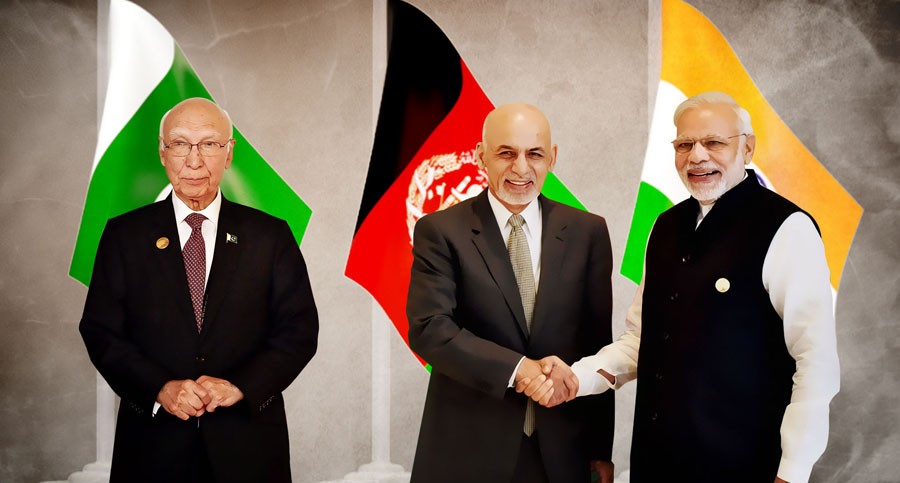
Five factors that pose serious challenge to Pakistan in 2017

There are five basic factors that will sway Pakistan’s foreign policy in the year 2017. Prominent amongst these is the Indian foreign policy towards Pakistan which has become more aggressive under Prime Minister Modi. India under Modi and the US under Donald Trump are going to make 2017 a year of confrontation vis-à-vis their adversaries, notably Pakistan.
The first challenge concerns the US foreign policy under Donald Trump. Obama’s tilt towards India, economically as well as strategically, had disturbed the strategic balance in South Asia. Moreover, his administration granted too much leverage to India in the post-withdrawal period in Afghanistan. This resulted in Indo-Afghan-US triangular alliance that hurt Pakistan’s interests in the region. The US administration under Trump will be a testing time for both the nations.
In 2017, Pakistan’s Foreign Office has a challenge for the next four years to deal with Trump. How to make Pakistan more attractive for economic investment, foreign aid and assistance for carrying out war on terror depends on how Foreign Office plays its cards efficiently.
The second challenge relates to the nature of Chinese foreign policy. General Xiong Guangkai says: "Pakistan is China’s Israel." Pakistan’s role has been central to China’s transition from a regional to a global power. It is at the heart of Beijing’s plans for a network of roads, pipelines, railways, energy projects, fiber optics and ports.
The way China is proceeding with its various networks in the region, it’s anticipated that in the next two decades, it will give a doctrine in line with the US "Monroe Doctrine of 1823", thereby declaring that this region is the sphere of influence of China. This will limit the US to the shores of Atlanta and Europe. Any such futuristic approach of Chinese foreign policy will bind Pakistan forever. Thus, Pakistan will have a permanent regional bloc which may be joined, in future, by countries like Russia and Iran.
Beijing had been dismissing alliances’ politics as a consequence of "Cold War thinking". However, now it has been more comfortable with alliances of its own to facilitate its strategic goals. India can’t be seen in the CPEC or, in broader sense, in One Belt, One Road (OBOR).
The US is supporting India out of the way for its major and dominant role in world politics. It’s a kind of check on China. But China has a tried and tested solution. If the US is going to smooth the path for India’s ascent, Pakistan would be the means for China to hold it down.
The third challenge to the Pakistan foreign policy in 2017 will be to break the isolation imposed by India, thereby developing and normalising relations with Afghanistan and Iran. Afghanistan, under Dr Ashraf Ghani, tried its best to smoothen relations with Pakistan. But somehow, this could not happen. Pakistan was very late in responding to his positive overtures. Now, India is right in the heart of Kabul from where it’s firing shots against Pakistan. "We learn from history that we do not learn from history" and one of the lessons that we don’t want to learn is that "one can change friends but not neighbours". Hence, Pakistan needs to get back Afghanistan as a friend due to the 2340-km long border; border management mechanism; cross-border terrorism; common enemies in shape of the Taliban; economic ties; and stable peace in the region. Peace in Afghanistan is attached with peace in Pakistan.
Relationship with Iran will also proceed in the same tone. Iran is also a candidate for the CPEC. Thus, Iran can be encouraged for having closer relationship with Pakistan rather than sitting in the lap of India.
The fourth challenge is to see whether CPEC is enough to boast of? Ask any one about the foreign policy of Pakistan and the answer will be CPEC, CPEC and CPEC. Nations form their foreign policies based on multi-pronged strategies. Yes, CPEC is a great achievement, but it’s not the foreign policy. Pakistan needs to normalise its relations with its neighbours, and the US. Pakistan’s role in the UN is going very slow. This needs to be expedited, especially with the arrival of the new Secretary General of the UN, António Guterres.
The fifth and final challenge that confronts Pakistan’s foreign policy is its crippling economy based on poor foreign trade. Without any new or creative economic perspective, Pakistan’s GDP growth rate is sluggishly 4.3 to 4.6 per cent. Pakistan is addicted to foreign aid and the year 2017 calls for a replacement of foreign aid by foreign trade. This is possible when we garner courage to say no to the US foreign assistance and emphasise on purchase of our products on preferential basis.
Once again, the role of Foreign Office has been very poor on this front. It needs to appoint economists as commercial attaché and receive their regular input for the Pakistani products in the host country. Believing in the 21st century as the era of economics, let the year 2017 be the year of economic development for Pakistan. All Pakistani missions abroad must follow the agenda on war footings: mustering economic opportunities for Pakistani products and attracting foreign investment for the country.
Pakistan deserves a foreign policy based on pragmatism and facts. Security, economy, normalisation of relations with key countries and countering its enemies must be robust for a brighter and prosperous Pakistan.